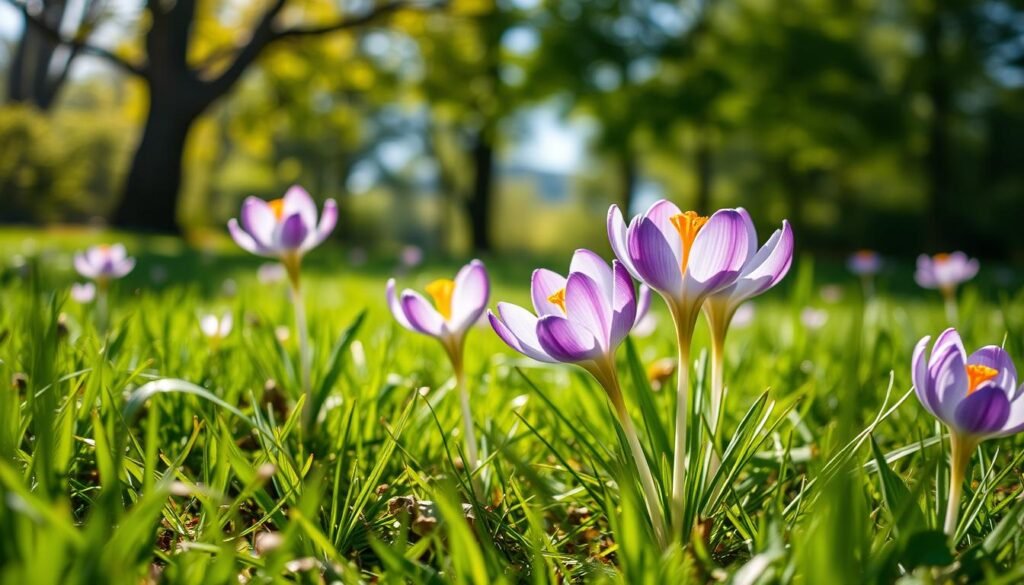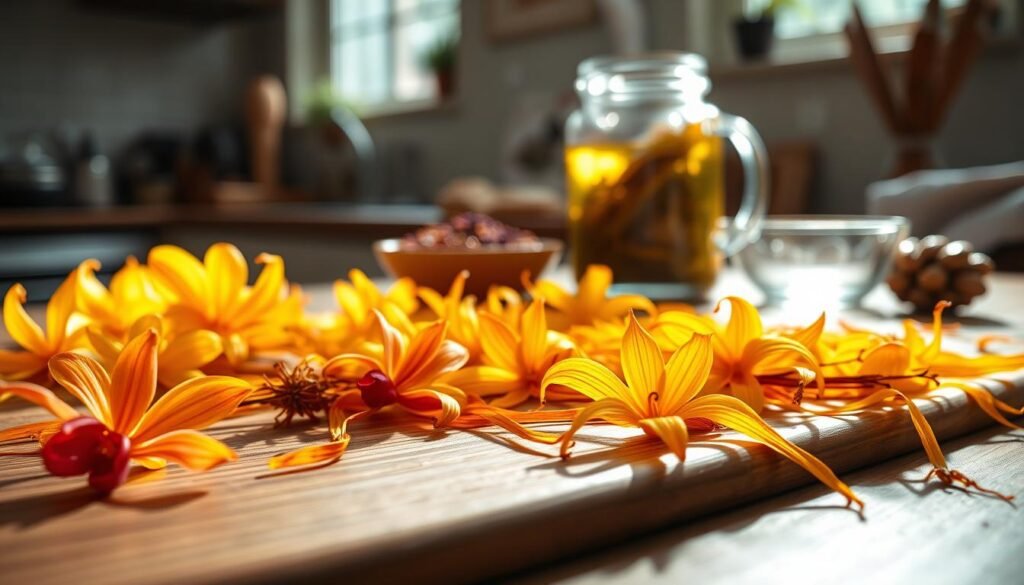Did you know about 264 million people worldwide face anxiety disorders? This fact points to an urgent need for effective, natural aids. The Crocus Sativus flower, or saffron, is seen as a promising option for anxiety relief. It’s the world’s most expensive spice and has been valued for its flavor and health benefits for centuries. Recent studies highlight saffron’s ability as a natural remedy for anxiety relief. These studies note saffron’s components might improve mood and reduce stress. This article will discuss saffron’s benefits and how to use it daily.
Key Takeaways
- The global prevalence of anxiety disorders highlights the need for natural solutions.
- Crocus Sativus, or saffron, is both a culinary spice and a medicinal herb.
- Research indicates saffron may assist in anxiety relief and mood enhancement.
- The constituents of saffron contribute to its therapeutic potential.
- Incorporating saffron into daily routines can be beneficial for mental health.
Understanding Crocus Sativus Flower (Saffron)
The Crocus Sativus, known as saffron, is a unique flower. It is famous for its beautiful purple flowers and the prized spice from its stigmas. This plant is important in cooking and traditional medicine, thanks to its health benefits and rich history.
What is Crocus Sativus?
The Crocus Sativus flower has lovely purple blooms. Each flower has three red stigmas that are carefully picked and dried. This process creates saffron spice, known for its unique taste and smell. Saffron is used globally in cooking and traditional medicine, helping improve mood and emotional health.
The History and Uses of Saffron
Saffron’s history goes back over 3,000 years, starting in places like Persia. It was valued not just in cooking but also for its health benefits. Old texts mention its use in treating mood disorders. Today, saffron is still used in cooking, medicine, and beauty, showing its lasting popularity.
The Science Behind Anxiety and Herbal Remedies
Anxiety shows up in our bodies in many ways. You might feel your heart beat faster, muscles tense up, or feel really tired. These symptoms come from changes in brain chemicals, especially a drop in serotonin. Serotonin helps control our mood.
How Anxiety Affects the Body
Anxiety does more than mess with your head. It makes your body act like it’s in danger. This triggers adrenaline. And that can cause:
- Increased heart rate
- Muscle tension
- Sweating
- Difficulty concentrating
- Fatigue
Knowing this helps explore natural remedies for anxiety.
Natural Remedies in Traditional Medicine
All over the world, people have turned to herbal medicine for a better mind state. Some herbs can change how neurotransmitters work, helping with mood. Take Crocus Sativus, or saffron, as an example. It might help with anxiety just like standard drugs do. You can learn more about saffron’s benefits here. Many health sources confirm saffron’s use in fighting anxiety here.
Crocus Sativus Flower (Saffron) for Anxiety
The Crocus Sativus flower, or saffron, is gaining attention for its use in anxiety relief. Studies show that its natural compounds, mainly safranal and crocin, may help calm the mind. This makes saffron a promising natural option for improving mental health.
Adding saffron to your daily routine can help alongside other natural calming herbs. For years, people have chosen these herbs over synthetic drugs. Early research shows saffron may help with mild to moderate anxiety. This suggests it’s worth considering, especially for those wary of medication.

| Component | Description | Potential Benefits |
|---|---|---|
| Safranal | A volatile oil extracted from saffron | May enhance mood and reduce anxiety symptoms |
| Crocin | A carotenoid pigment in saffron | Could promote a sense of calm and relaxation |
| Historical Use | Utilized in traditional medicine for anxiety | Provides a safe, natural alternative for mental wellness |
Saffron stands out as a beneficial herb for those fighting anxiety. It provides relief in a gentle, holistic way. By adding it to their routines, people can enjoy a natural path to feeling better.
Benefits of Saffron as a Mood Enhancer
Saffron comes from the Crocus sativus flower and is known for boosting mood. Studies show its promising results in enhancing mental health. Its unique makeup plays a big role in improving how we feel.
Research on Saffron’s Antidepressant Properties
Many studies found saffron has antidepressant effects. People who added saffron to their daily life saw better mood and less anxiety. This suggests saffron could be an alternative to usual antidepressants for some.
How Saffron Acts as a Serotonin Booster
Saffron boosts serotonin, which makes us feel happy and calm. It helps lift your spirits and reduce anxiety. So, it’s a great option for those facing challenges with their mood.

How to Use Saffron for Anxiety Relief
Exploring saffron as a remedy for anxiety requires understanding its use. It’s critical to know the right dosage and ways to incorporate it daily. This will help maximize its benefits for anxiety relief.
Dosage Recommendations for Anxiety Management
Finding the correct saffron dosage is essential. A daily intake of 30 mg to 200 mg is suggested. It’s important to consider your health, weight, and how you react to saffron. Slowly adjusting the amount can help find the best level for relief.
Best Ways to Incorporate Saffron into Your Routine
Incorporating saffron into your life can be easy and enjoyable. Here are some ways:
- Cooking: Saffron adds flavor and color to rice, soups, and sauces.
- Tea: Brewing saffron threads in hot water makes a relaxing tea.
- Supplements: Saffron capsules provide a precise dose and are easy to use.
By thoughtfully adding saffron to your routine, you can customize your experience to fit your lifestyle and preferences.

Comparing Saffron with Other Herbal Supplements
Looking at natural ways to ease anxiety? The saffron comparison with other herbs is key. Saffron comes from the Crocus sativus flower and is good at reducing anxiety.
Many other herbs also offer benefits. It’s important to know how they differ. This helps pick the right herbal remedy.
Potency and Efficacy of Saffron vs. Other Remedies
Saffron is great for lifting your mood, more so than some other herbs. Studies show it might work better than chamomile for anxiety. Chamomile can calm you, but saffron has proven stronger in tests.
Valerian root, which relaxes, may not be as effective as saffron. This saffron comparison shows why it’s vital to compare herbs.
Choosing the Right Herbal Supplement for You
Picking an herbal supplement depends on your anxiety and what you prefer. Always get advice from experts when considering options like saffron, chamomile, or valerian root.
Each supplement has different effects and might interact with medicines. Knowing this helps make the best choice for your needs. For more on saffron’s benefits, check this link here.
Potential Side Effects and Considerations
It’s crucial to know about saffron’s safety and possible side effects, especially if you’re considering it for anxiety relief. Generally, saffron is safe for most when taken in right amounts. But, it’s good to be aware of possible side effects. These can include feeling sick or having an allergic reaction in some cases.
Effects of saffron might change depending on your health and any medications you’re taking. It’s important to keep these in mind.
Understanding Saffron Safety and Tolerance
The safety profile of saffron is key to its use. Everyone should pay attention to how they react to prevent negative effects. If you’re on certain drugs or have health issues, being extra careful is vital. Doing your homework on saffron and thinking about your own health can lead to a good experience.
When to Consult a Healthcare Professional
If you’re thinking about adding saffron to your health plan, talking to a doctor is a smart move. They can give advice that matches your health background and current meds. This step can help avoid bad side effects and make sure saffron is used safely. It makes managing anxiety more effective.
| Potential Side Effects | Considerations |
|---|---|
| Nausea | Pay attention to dosage to minimize this risk. |
| Allergic Reactions | Monitor for any signs of adverse reactions. |
| Drowsiness | Evaluate how saffron affects individual energy levels. |
| Interactions with Medications | Discuss with a healthcare provider before starting. |
Real-Life Testimonials on Saffron and Anxiety Relief
Many people share stories about saffron helping with anxiety. These saffron testimonials show that it improves mood and well-being when used daily. Individuals noticed lower stress and felt more at ease.
Personal Stories of Saffron Users
Users report feeling more emotionally balanced after using saffron. They could manage stress better, boosting their confidence and life quality. They felt calmer and more ready to face challenges without anxiety. This change comes not just from saffron itself but from community support too.
Expert Opinions on Herbal Approaches
Experts confirm saffron’s benefits for anxiety management. They underline the need to blend natural ingredients like saffron into diets for mental health. They see saffron as a good addition to usual treatments, not a replacement. Those interested can learn more about saffron’s benefits in this article.
Conclusion
The Crocus Sativus flower, also known as saffron, is gaining attention as a natural anxiety remedy. Its long history and recent studies that show its mood-boosting effects make it a good choice. People looking beyond standard medicine find saffron an exciting option. Many have seen real benefits from using this colorful spice for anxiety.
When thinking about using saffron, considering one’s health and seeking professional advice is crucial. Going about it carefully not only makes the experience better but also ensures it’s safe. This overview highlights the importance of making well-informed choices. It helps individuals approach their mental health journey with more confidence.